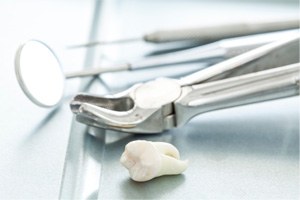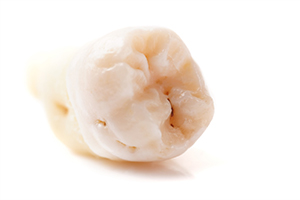Tooth Extractions – Bloomfield, CT
A Step Toward Improved Oral Health

As your dentist in Bloomfield, we want to help you retain all of your natural teeth for as long as possible. Unfortunately, though, tooth removal is sometimes the best way to support an individual’s oral health. If that is ever true in your case, rest assured that we will handle the procedure as gently as possible. Read on below to learn more about reasons for tooth extractions and what to expect during this treatment.
Why Choose Family Dental Practice of Bloomfield for Tooth Extractions?
- Gentle, Compassionate Team
- Wisdom Tooth Extractions Available
- Multiple Sedation Options
Reasons Why Tooth Extractions Are Necessary

Here are some examples of circumstances that may necessitate one or more tooth extractions in Bloomfield:
- Severe damage or decay has affected a tooth to the point where other restorative treatments would be ineffective.
- It is necessary to remove a tooth to make room for orthodontic treatment.
- A primary (baby) tooth has not fallen out in a timely manner.
- A tooth is impacted (stuck beneath the gumline) and posing a threat to the tissue around it. This is commonly the case with wisdom teeth.
- Advanced gum disease has caused one or more teeth to become loose.
The Process of Removing a Tooth

There are two main categories of tooth extractions:
During a simple extraction, we use an elevator to slightly lift the tooth out of its socket. Next, we grip it with forceps and rock it back and forth in order to break the connective tissues that are keeping it in place.
During a surgical extraction, we may have to create incisions in the gums or break a tooth into pieces in order to remove it.
Whichever type of extraction you undergo, you can be sure that we will do everything we can to make you comfortable during your procedure. For example, we will numb your mouth. We may also sedate you.
Tooth Extraction Aftercare

To facilitate an easy and complication-free recovery, you should:
- Take any medications as recommended by your dentist.
- After the first 24 hours of your recovery, start rinsing your mouth with salt water a few times each day.
- Do not smoke.
- Do not use a drinking straw.
- Keep your head propped up on pillows while sleeping.
- Get plenty of rest.
You should also be sure to attend all recommended follow-up appointments with your dentist. They will monitor your recovery and let you know when you are eligible for tooth replacement. Replacing lost teeth as soon as possible can prevent future dental problems, such as misaligned teeth, further tooth loss, and bone deterioration in the jaw.
Tooth extractions are nothing to be afraid of. Contact us today to learn more about this procedure.
Understanding the Cost of Tooth Extractions

The cost of a tooth extraction depends on a few different factors. When you visit your emergency dentist, our team will assess the details of the situation before we provide a price estimate. In most cases, extractions are relatively affordable. If you need extra assistance to fit your treatment into your budget, we are ready to help you file insurance claims, apply for financing, or take advantage of our discount plan.
Factors That Can Affect Tooth Extraction Cost

Because each patient’s circumstances are unique, we cannot determine the cost of a tooth extraction before we have had time to learn about the specifics of a situation. Some factors that could influence the price of your treatment include:
- The type and location of the tooth that needs to be removed. Some teeth are easier to remove than others, meaning that they end to incur lower fees. On the other hand, wisdom teeth extractions tend to cost more due to their complex nature.
- The number of extractions needed. Logically, extracting more teeth can raise the overall cost of care.
- The overall complexity of the case. If there are any factors that increase the complexity of your case, you may have to pay more.
- Additional treatments. Tooth replacement, such as a bridge or dental implant, or other forms of follow-up care can add to the total price of your dental care.
Does Dental Insurance Cover Tooth Extractions?

It is fairly standard for dental insurance to cover tooth extractions. Simple extractions are usually classed as a minor procedure, meaning that around 80% of their cost might be covered. Surgical extractions may be just 50% covered. You will need to check the details of your policy to find out exactly how it applies. Our practice is in-network with many insurance companies, and we will be happy to help you file your claims and maximize your benefits.
Other Options for Making Tooth Extractions Affordable

Beyond insurance, there are a few provisions that may make it easier for you to afford your tooth extractions:
- Financing. We are partnered with CareCredit, a third-party lender that offers low-interest payment plans for dental services. It is easy to apply, and most patients qualify for credit.
- Essential Dental Plan. This discount plan allows patients to enjoy reduced fees on virtually all the services we offer, including tooth extractions
- Promotional pricing. We periodically offer special pricing on dental implants and other services. You can give our team a call to find out what offers are currently available.
Tooth removal can be an important part of your oral wellness. To learn more about this procedure and its cost, schedule a consultation with Family Dental Practice of Bloomfield today.
Tooth Extraction FAQs

The team at Family Dental Practice of Bloomfield is proud to offer gentle tooth extractions for our valued patients. Still, we understand that the prospect of getting a tooth removed can be a little intimidating. To help you prepare for the procedure and put your mind at ease, we have compiled the following list of FAQs about tooth extractions, along with succinct answers. If you would like more explanation on anything you discover here, reach out to us directly.
Does Getting a Tooth Extracted Hurt?
We strive to make our patients as comfortable as possible. We will numb your mouth with local anesthesia, which will prevent you from feeling pain. However, you may still feel some pressure and tugging sensations as we remove the tooth. In some cases, we also use sedation to help patients relax.
After any anesthesia and sedation wear off, you can expect some soreness. Any discomfort should be manageable with the help of pain relievers and other measures, such as getting plenty of rest. Most patients are feeling much better within a few days of their procedure.
Is There an Alternative to a Tooth Extraction?
In some cases, we are able to save an infected tooth by performing root canal therapy. If a tooth, such as a wisdom tooth, is impacted, we might be able to leave it in the mouth with minimal risk to the patient.
However, you can be sure that if we recommend that you get a tooth extracted, we have already considered other options. We recognize that helping a patient keep their real teeth is always preferable to tooth replacement, even though modern tooth replacement options are very natural-looking and highly functional.
What Are My Options for Replacing a Missing Tooth?
There are a few different ways to replace a missing tooth:
- A dental implant rebuilds a tooth from the root up. This is the longest-lasting and most reliable form of tooth replacement. However, it does tend to cost more than other options.
- A dental bridge is a restoration that depends on the abutment teeth (the teeth next to an empty space) for support. It can last for 10 years or longer and provide reliable function and pleasing aesthetics.
- A partial denture is a removable prosthetic that gets secured in the mouth with the help of small clasps. It can replace several teeth throughout a dental arch if necessary.
Can I Leave the Space Empty After a Tooth Extraction?
If you had a wisdom tooth removed, then yes, you can leave the space empty. You also do not need to worry about tooth replacement if supernumerary (extra) teeth were removed. In virtually all other circumstances, though, you should replace a missing tooth as soon as your circumstances allow.
Failing to replace a tooth could lead to an issue known as dental drift, wherein nearby teeth drift into the empty space. This can lead to a misaligned bite and contribute to future tooth loss. A gap in your smile could also negatively affect your ability to chew your favorite foods and smile with confidence.
